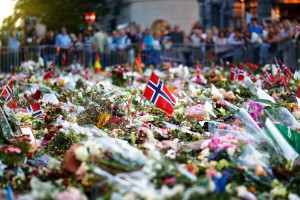“Not all Muslims are terrorists, but all terrorists are Muslims”. Most people have probably heard this expression at some point in their lives. But not many have acknowledged how wrong it could be. Unfortunately, this idea is quite often taken for granted. For some reason people assume that the majority of terrorist attacks are committed by Muslims. However, the real situation turns out to be completely different from what most people think – adherents of other religions as well as non-religious people commit terrorist attacks quite often, too. When it comes to thinking of terrorism, most people tend to imagine a person blowing himself up in a public place. But, in fact, it would be more correct to think of terrorism as a violent act intended to intimidate population and pursue political goals.

So how come so many people have a wrong idea of terrorism? Why do they always associate terrorism only with Islam and almost never see Christian, Buddhist or Jewish criminals as terrorists? Perhaps, we should blame the media and the way it presents information and portrays Muslims. If a crime is committed by a Muslim, it will draw more attention and provoke heated debates. An incident will be discussed in the media over and over again. Most likely, it will be viewed as a ‘terrorist attack’ straight away. Whereas, when an act of terrorism committed by a person or people of a different religion occurs, less attention is paid to the discussion about religious views of the person, and it will take time to confirm that the incident was a terrorist attack. In fact, many events would not be covered by the media at all. For example, not many people have heard of Italian anarchist group FAI that had already been operating and posing threat to national security in Italy and some other countries in Europe for more than 10 years. Criminal activity of this non-religious terrorist organization is rarely covered in the news.
Investigation of the statistical data provided by FBI and Europol indicates that religion does not have much to do with terrorism. Indeed, religiously inspired terrorism is a rare phenomenon. According to a Europol report, less than 2% of total amount of terrorist attacks in Europe are based on religious beliefs. In the US, where Muslims are frequently portrayed as perpetrators, Islamic terrorist attacks make up only 6%, which is even less then the number of terrorist attacks committed by Jewish extremists. Most of the terrorist acts are committed by adherents of other religions or have nothing to do with religion at all. Still, mostly terrorists are believed to be Muslims. Incidents with involvement of terrorists that are not connected with Islam are hardly ever discussed. The reason for that might be the fact that terrorist attacks committed by Islamists usually take lives of many people at the same time, while terrorist attacks committed by other factions usually claim only a few people’s lives.
So what is and is not associated with terrorism?
On the 24th of March 2015, the world witnessed the airplane crash in the French Alps that claimed the lives of 150 people. A few days later it was reported that the plane was crashed deliberately by the depressed co-pilot Andreas Lubitz. This person was called a ‘mass-murderer’ for his actions, no one accused him of being a terrorist. If Andreas Lubitz was somehow connected with Islam, then, the stereotype about terrorist attacks would probably be applied to this case without any explicit consideration, and some lights on the incident would be shed on the incident in a different way. But he was not a Muslim, and his religious views are not mentioned anywhere in the news reports. Therefore following this logic, it is fair to assume that terrorism is mostly associated with Islam simply due to labelling by the media.

Another example of people’s unwillingness to label a non-Muslim person as a terrorist can be found in examining Norway attacks in 2011. A Norwegian perpetrator inspired by right-wing extremist ideology, Anders Behring Breivik, first blew up a car in the centre of Oslo, and then opened fire at teenagers in a summer camp on the island of Utøya. The horrible events that took place there shocked the whole of Europe, and provoked a lot of discussions and debates about the personality, objectives, and mental health of the murderer. This case, though, was not discussed much in the media outside of Europe.
Even though that case is now considered as terrorism, it took quite a lot of time to define it as such. In fact, a year had passed after the incident when the Norwegian court came to the conclusion that what Breivik had done was a terrorist attack. Especially in the beginning people tried to somehow justify his actions. Mental disorders were one of the main arguments to explain Breivik’s behavior. It is also important to mention that in this case religious views of the perpetrator inspired his actions. However, not in the usual way. As the terrorist claimed, he was ‘a 100% Christian’ and the reason for his actions was islamophobia. Perhaps reasons for the extreme length of the investigation as well as the trial to determine his punishment where that Norway aims to bear an image of being a safe country free from such severe crimes as terrorism, and that Breivik’s religious views did not fit in with the stereotypical concept of a Muslim-terrorist. Although no Islamic implications as a driving force for this massacre were found in this case, it is still a terrorist attack.
Still, even after the Norwegian court announced their verdict and proclaimed Breivik a terrorist, not everyone agreed with the statement. Deborah Orr, a journalist who works for ‘the Guardian’, announced that “Anders Behring Breivik is not a terrorist, he is a mass-murderer”. But what exactly makes some people distinguish terrorism from mass-murder? In this case especially, the event had political implications – Breivik’s actions were directed at the Norwegian government and their immigration policies.
Getting back to the initial belief of Islam being tightly connected with terrorism, it is important to mention once again that this idea is completely wrong and is mostly imposed on people by the media. As statistics reveal, religious implications and Muslims in general are not associated with terrorist attacks as often as most people imagine. Adherents of other religions as well as non-religious people led by extremist ideologies constitute the majority of terrorists. Therefore, people should not think of terrorism as committed only by Muslims and see all believers of Islam as terror suspects. Not all Muslims are terrorists, and not all terrorists are Muslim.
By Evgenia Isaeva
Image credit:
Picture 1: Jason Powell, licensed under CC BY-NC 2.0
Picture 2: Dmitry Valberg, licensed under CC BY-NC-ND 2.0










